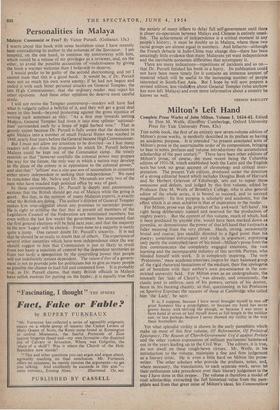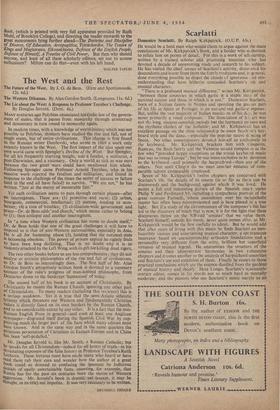Milton's Left Hand
THIS noble book, the first of an entirely new seven-volume edition of Milton's prose works, is modestly described in its preface as having an academic purpose. It is intended "to present annotated texts of Milton's prose in the ascertainable order of its composition, bringing to bear in notes, prefaces and volume introductions the accumulated scholarship of the past century." There have been other editions of Milton's prose, of course, the most recent being the Columbia edition of 1931-38, which established both the Latin and the English texts but took no great account of chronology and critical inter- pretation. The present Yale edition, produced under the direction of a strong editorial board which includes Douglas Bush of Harvard and Sir Herbert Grierson of Edinburgh, sets out to repair these omissions and defects, and judged by this first volume, edited by Professor Don M. Wolfe of Brooklyn College, who is also general editor of the whole series, it is bound to succeed, and to succeed magnificently. Its first purpose is scholarly and academic, but the effect which it at once achieves is that of inspiration to the reader.
For Milton, prose was the product of his awkward 'left hand', his right being deliberately trained and reserved for the production of mighty poetry. But the content of this volume, much of which, had it been produced by anyone else, would have been marked down as juvenilia, so demonstrates the power of that left hand that it extracts a fuller meaning from the very phrase. Harsh, strong, occasionally brutal and coarse; less steadily directed to a flied point than his poetry; sometimes extravagant and crude in argument; expressing only partly the controlled force of his mind—Milton's prose from the first communicates the completely engaged emotions, the vast learning and the incomparable industry of this terrible Puritan, who blinded himself with work. It is completely inspiring. The very 'Prolusions,' mere academic exercises, inspire by their balanced grasp of the rigid rhetorical limitations of the medium, their fine apologetic air of boredom with their author's own pre-eminence in the con- stricted university field. For Milton even as an undergraduate, the intensely fair 'lady of Christ's,' was already, and consciously, the classic poet in embryo, sure of his powers, certain of his destiny, fierce in his burning chastity, so that, questioning in his Prolusion on Sportive Exercises the reasons of those at Cambridge who called him the Lady', he says: It is, I suppose, because I have never brought myself to toss of great bumpers like a prize-fighter, or because my hand has never grown horny with 'driving the plough, or because I was never a farm hand at seven or laid myself down at full length in the midday sun; or last perhaps because I never showed my virility in the way these brothellers do.
Yet what splendid virility is shown in the early pamphlets which make up most of this first volume, Of Reformation, Of Prelatical Episcopacy, The Reason of Church-Government Urg'd against Prelacy and the other violent expressions of militant puritanism hammered out in the years leading up to the Civil War. The editors, it is true, do not dwell on these rough-hewn virtues. Mr. Wolfe, in his introduction to the volume, maintains a fine and firm judgement as a literary critic. He is even a little hard on Milton the prose- writer. The other scholars who provide the prefaces, notes, and, where necessary, the translations, to each separate work, never let their enthusiasm take precedence over their literary judgement in the way I have done in this review. The volume is therefore a model of cool scholarship, extracting the full historical value from the pam- phlets and from that great mine of Milton's ideas, his Commonplace Book, (which is printed with very full apparatus provided by Ruth Mohl, of Brooldyn College), and directing the reader onwards to the great monuments lying further ahead—The Doctrine and Discipline of Divorce, Of Education, Areopagitica, Tetrachordon, The Tenure of fangs and Magistrates, Eikonoklastes, Defence of the English People, Defence of Himself, A Treatise of Civil Power. But then why should anyone, and least of all these scholarly editors, set out to arouse enthusiasm? Milton can do that—even with his left hand.
WALTER TAPLIN



































 Previous page
Previous page